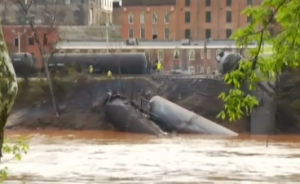
(Reuters) — A CSX Corp train carrying crude oil derailed and burst into flames in downtown Lynchburg, Virginia on Wednesday (April 30), spilling oil into the James River and forcing the evacuation of hundreds.
CSX said 15 cars derailed at 2:30 p.m. EDT on a train traveling from Chicago to Virginia. Photos and video footage from the scene showed high flames and a large plume of black smoke. Officials said there were no injuries, but some 300 to 350 people in a half-mile radius had been evacuated.
The three cars, each weighing 100 tons, fell down an embankment into the river and were still leaking oil on Wednesday evening, city mayor Michael Gillette told Reuters.
There were no injuries, and the nearly 350 residents who were evacuated earlier in the day were allowed to return to their homes, he said.
“We’ve heard this noise, we looked out of the window where we were at Shoemakers restaurantand we saw a giant fire ball, the trains were burning and we had to evacuate the building,” said one witness, Lynchburg resident.
This is the sixth fiery derailment to occur in North America since a runaway train in Lac-Megantic, Quebec, derailed and exploded, killing 47 people last July. Another CSX train carrying crude oil derailed in Philadelphia in January, nearly toppling over a bridge.
The latest incident, a short distance from office buildings in the city of 77,000, brought more calls from environmentalists for stricter regulations on shipping crude oil by rail.
Containing the oil spill was the city’s biggest concern as cleanup efforts began. The river flows into Chesapeake Bay.
CSX was sending a crew to clean up the wreckage on Wednesday evening, and city officials expected the company to remove the derailed tank cars by the end of business on Thursday.
Residents of Lynchburg described the incident. “It was scary, and we hoped and prayed that nobody got hurt,” said one local resident.
“As the flames grew, I stood and watched it a little bit, I took a couple of pictures, and then realized this is probably a dangerous situation, especially there were so many tank cars, and then I watched as whatever fuel oil it was started down the river on fire,” another Lynchburg resident said describing the incident.
National Transportation Safety Board investigators were already on site. The U.S. Department of Transportation said it was sending Federal Railroad Administration inspectors to the scene, and the Environmental Protection Agency said an official was heading there to help the state monitor air quality.
The origin of the cargo, the train’s final destination and the cause of the accident were not known. One of the only oil facilities to the east of Lynchburg is a converted refinery in Yorktown, now a storage depot run by Plains All American. The company did not immediately reply to queries.
With more trains hauling crude and flammable liquids across North America, U.S. regulators are expected soon to propose new rules for more robust tank cars to replace older models; Canadian authorities did so last week.
Tougher rules could raise costs for companies that lease tank cars and boost business for rail-car makers.
Residents across the country have voiced concern about oil trains, often a mile long, passing near their communities, particularly in New York and the Pacific Northwest. Derailments have also occurred in North Dakota and Alabama.
In Virginia, environmental groups including the Sierra Club and the Chesapeake Bay Foundation have opposed expansion of crude-by-rail shipments through the region to the Yorktown terminal, which can handle 140,000 barrels per day. CSX’s route through populated areas like Lynchburg and its proximity to the James River have been mentioned as special concerns.
In January, CSX Chief Executive Michael Ward told analysts the company planned to boost crude-by-rail shipments by 50 percent this year. He said the Jacksonville, Florida-based railroad was working with U.S. regulators to address safety concerns in light of recent derailments and fires.







